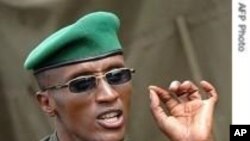The new year brought a bit of welcome news from the strife-torn eastern region of the Democratic Republic of the Congo.
Rebel leader Laurent Nkunda, long a source of trouble in the area by waging a guerrilla war against the Kinshasa government, was arrested last week by Rwandan military forces working together with their Congolese counterparts. His removal is a welcome step on the road to peace and a good sign of newfound cooperation among the governments in the African Great Lakes region.
Nkunda, leading the National Congress for the Defense of the People, claimed to be defending Congo’s Tutsis against attacks from the FDLR [Democratic Forces For The Liberation Of Rwanda], a group led by Rwandan Hutus who have used the area as a sanctuary since shortly after the Rwandan genocide 15 years ago.
Nkunda’s rebels have clashed repeatedly with government forces since a peace agreement collapsed last year. Last fall, amid a campaign that displaced 250,000 people, generated 40,000 refugees and killed hundreds of civilians, Nkunda threatened to escalate his campaign and “liberate” all of the DRC. Such brashness would have destabilized the entire area and ultimately could have been his undoing.
Instead, Nkunda owes his fate to an unprecedented alliance, in which the Congolese and Rwandan governments launched a joint military operation on January 20 against Nkunda’s and other rebel forces. He was arrested January 22 in Rwanda after fleeing Congolese and Rwandan units working together near the Congolese town of Bunagana. DRC officials have asked that he be extradited to Congo to be tried for treason and war crimes.
Two other Congolese militia groups have voluntarily joined the Congolese-Rwandan alliance against the murderous FDLR, which is guilty of heinous crimes over many years and is a root cause of instability in the region.
The arrest of Laurent Nkunda and the new cooperation among armies and militias that have long mistrusted and fought one other are important steps on the road to peace in eastern Congo. More needs to be done. The violence has raged much too long and the region’s resources have much to offer its people if peace can be restored.
During the crisis the United States has worked to assist the refugees and internally displaced people forced to flee the fighting, and those efforts will continue.
Rebel leader Laurent Nkunda, long a source of trouble in the area by waging a guerrilla war against the Kinshasa government, was arrested last week by Rwandan military forces working together with their Congolese counterparts. His removal is a welcome step on the road to peace and a good sign of newfound cooperation among the governments in the African Great Lakes region.
Nkunda, leading the National Congress for the Defense of the People, claimed to be defending Congo’s Tutsis against attacks from the FDLR [Democratic Forces For The Liberation Of Rwanda], a group led by Rwandan Hutus who have used the area as a sanctuary since shortly after the Rwandan genocide 15 years ago.
Nkunda’s rebels have clashed repeatedly with government forces since a peace agreement collapsed last year. Last fall, amid a campaign that displaced 250,000 people, generated 40,000 refugees and killed hundreds of civilians, Nkunda threatened to escalate his campaign and “liberate” all of the DRC. Such brashness would have destabilized the entire area and ultimately could have been his undoing.
Instead, Nkunda owes his fate to an unprecedented alliance, in which the Congolese and Rwandan governments launched a joint military operation on January 20 against Nkunda’s and other rebel forces. He was arrested January 22 in Rwanda after fleeing Congolese and Rwandan units working together near the Congolese town of Bunagana. DRC officials have asked that he be extradited to Congo to be tried for treason and war crimes.
Two other Congolese militia groups have voluntarily joined the Congolese-Rwandan alliance against the murderous FDLR, which is guilty of heinous crimes over many years and is a root cause of instability in the region.
The arrest of Laurent Nkunda and the new cooperation among armies and militias that have long mistrusted and fought one other are important steps on the road to peace in eastern Congo. More needs to be done. The violence has raged much too long and the region’s resources have much to offer its people if peace can be restored.
During the crisis the United States has worked to assist the refugees and internally displaced people forced to flee the fighting, and those efforts will continue.




